原因、目的、结果状语从句讲练
- 格式:doc
- 大小:32.00 KB
- 文档页数:3
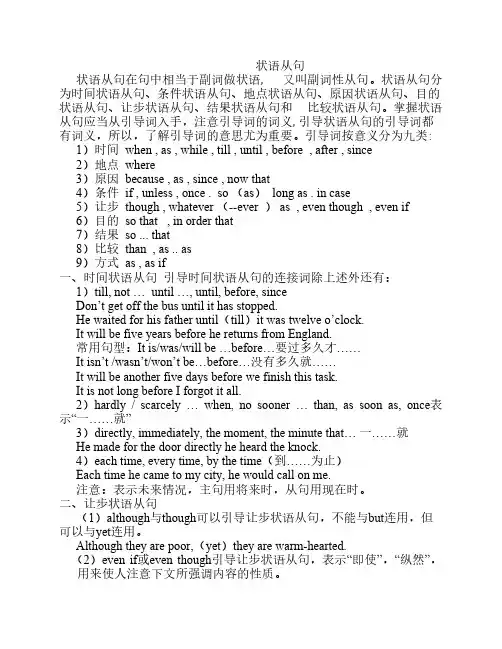
状语从句状语从句在句中相当于副词做状语, 又叫副词性从句。
状语从句分为时间状语从句、条件状语从句、地点状语从句、原因状语从句、目的状语从句、让步状语从句、结果状语从句和 比较状语从句。
掌握状语从句应当从引导词入手,注意引导词的词义,引导状语从句的引导词都有词义,所以,了解引导词的意思尤为重要。
引导词按意义分为九类: 1)时间 when , as , while , till , until , before , after , since2)地点 where3)原因 because , as , since , now that4)条件 if , unless , once . so (as) long as . in case5)让步 though , whatever (--ever ) as , even though , even if6)目的 so that , in order that7)结果 so ... that8)比较 than , as .. as9)方式 as , as if一、时间状语从句引导时间状语从句的连接词除上述外还有:1)till, not … until …, until, before, sinceDon’t get off the bus until it has stopped.He waited for his father until(till)it was twelve o’clock.It will be five years before he returns from England.常用句型:It is/was/will be …before…要过多久才……It isn’t /wasn’t/won’t be…before…没有多久就……It will be another five days before we finish this task.It is not long before I forgot it all.2)hardly / scarcely … when, no sooner … than, as soon as, once表示“一……就”3)directly, immediately, the moment, the minute that… 一……就He made for the door directly he heard the knock.4)each time, every time, by the time(到……为止)Each time he came to my city, he would call on me.注意:表示未来情况,主句用将来时,从句用现在时。
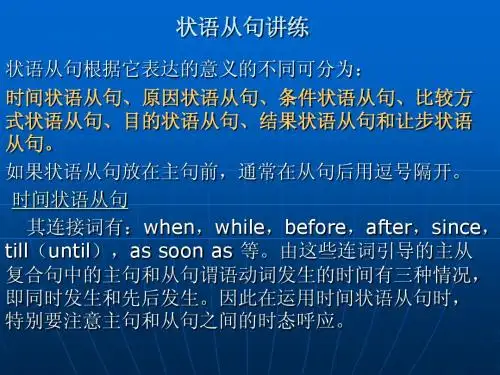
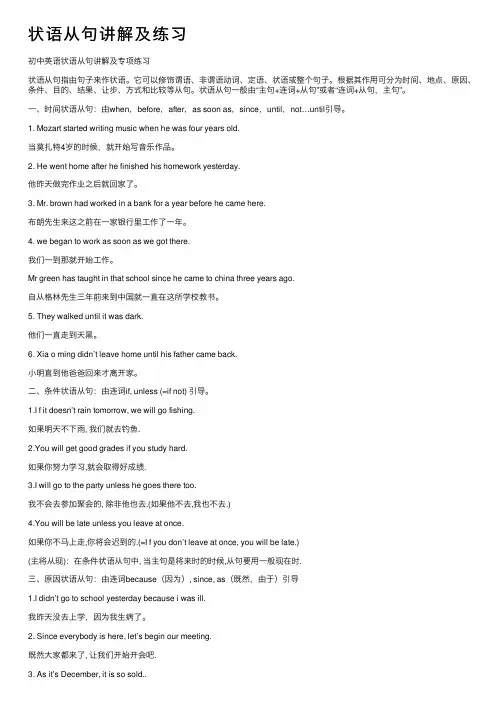
状语从句讲解及练习初中英语状语从句讲解及专项练习状语从句指由句⼦来作状语。
它可以修饰谓语、⾮谓语动词、定语、状语或整个句⼦。
根据其作⽤可分为时间、地点、原因、条件、⽬的、结果、让步、⽅式和⽐较等从句。
状语从句⼀般由“主句+连词+从句”或者“连词+从句,主句”。
⼀、时间状语从句:由when,before,after,as soon as,since,until,not…until引导。
1. Mozart started writing music when he was four years old.当莫扎特4岁的时候,就开始写⾳乐作品。
2. He went home after he finished his homework yesterday.他昨天做完作业之后就回家了。
3. Mr. brown had worked in a bank for a year before he came here.布朗先⽣来这之前在⼀家银⾏⾥⼯作了⼀年。
4. we began to work as soon as we got there.我们⼀到那就开始⼯作。
Mr green has taught in that school since he came to china three years ago.⾃从格林先⽣三年前来到中国就⼀直在这所学校教书。
5. They walked until it was dark.他们⼀直⾛到天⿊。
6. Xia o ming didn’t leave home until his father came back.⼩明直到他爸爸回来才离开家。
⼆、条件状语从句:由连词if, unless (=if not) 引导。
1.I f it doesn’t rain tomorrow, we will go fishing.如果明天不下⾬, 我们就去钓鱼.2.You will get good grades if you study hard.如果你努⼒学习,就会取得好成绩.3.I will go to the party unless he goes there too.我不会去参加聚会的, 除⾮他也去.(如果他不去,我也不去.)4.You will be late unless you leave at once.如果你不马上⾛,你将会迟到的.(=I f you don’t leave at once, you will be late.)(主将从现):在条件状语从句中, 当主句是将来时的时候,从句要⽤⼀般现在时.三、原因状语从句:由连词because(因为), since, as(既然,由于)引导1.I didn’t go to school yesterday because i was ill.我昨天没去上学,因为我⽣病了。
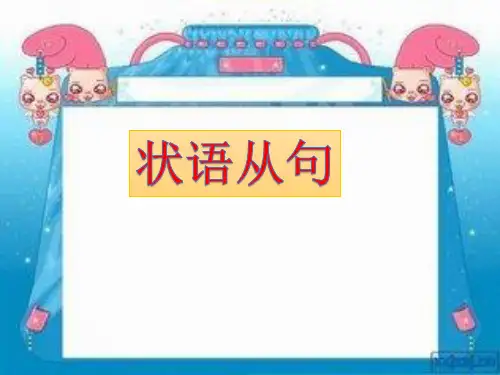
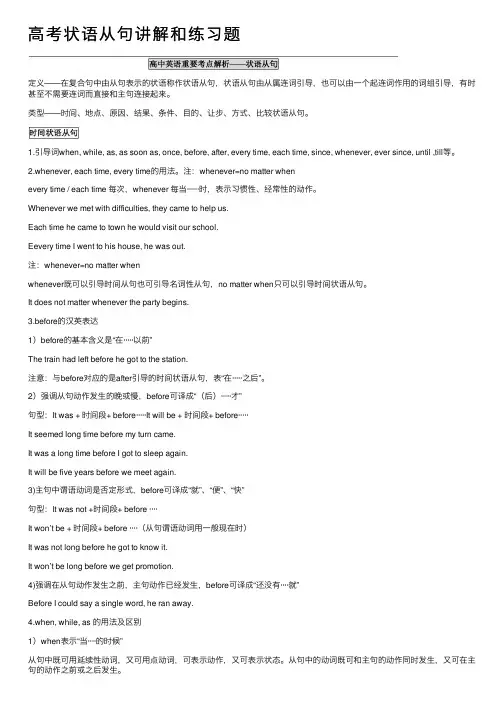
⾼考状语从句讲解和练习题定义——在复合句中由从句表⽰的状语称作状语从句,状语从句由从属连词引导,也可以由⼀个起连词作⽤的词组引导,有时甚⾄不需要连词⽽直接和主句连接起来。
类型——时间、地点、原因、结果、条件、⽬的、让步、⽅式、⽐较状语从句。
1.引导词when, while, as, as soon as, once, before, after, every time, each time, since, whenever, ever since, until ,till等。
2.whenever, each time, every time的⽤法。
注:whenever=no matter whenevery time / each time 每次,whenever 每当······时,表⽰习惯性、经常性的动作。
Whenever we met with difficulties, they came to help us.Each time he came to town he would visit our school.Eevery time I went to his house, he was out.注:whenever=no matter whenwhenever既可以引导时间从句也可引导名词性从句,no matter when只可以引导时间状语从句。
It does not matter whenever the party begins.3.before的汉英表达1)before的基本含义是“在·····以前”The train had left before he got to the station.注意:与before对应的是after引导的时间状语从句,表“在·····之后”。

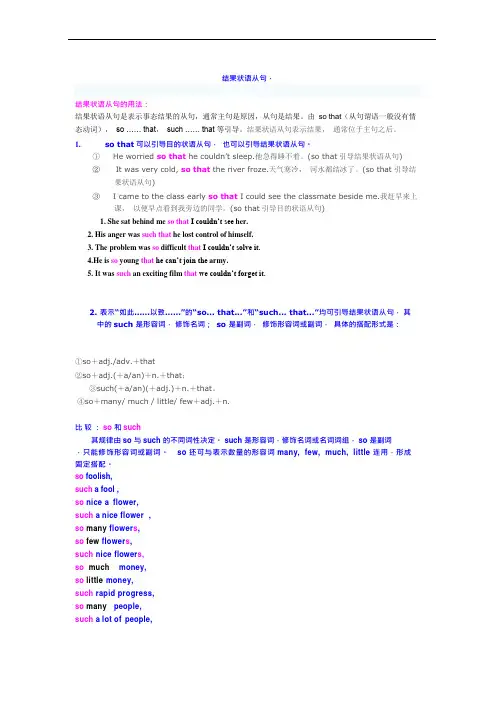
结果状语从句,结果状语从句的用法:结果状语从句是表示事态结果的从句,通常主句是原因,从句是结果。
由so that(从句谓语一般没有情态动词),so …… that,such …… that 等引导。
结果状语从句表示结果,通常位于主句之后。
1.so that 可以引导目的状语从句,也可以引导结果状语从句。
①He worried so that he couldn’t sleep.他急得睡不着。
(so that 引导结果状语从句)②It was very cold, so that the river froze.天气寒冷,河水都结冰了。
(so that 引导结果状语从句)③I came to the class early so that I could see the classmate beside me.我赶早来上课,以便早点看到我旁边的同学。
(so that 引导目的状语从句)1.She sat behind me so that I couldn’t see her.2.His anger was such that he lost control of himself.3.The problem was so difficult that I couldn’t solve it.4.He is so young that he can’t join the army.5. It was such an exciting film that we couldn’t forget it.2. 表示“如此……以致……”的“so... that...”和“such... that...”均可引导结果状语从句,其中的such 是形容词,修饰名词;so 是副词,修饰形容词或副词,具体的搭配形式是:①so+adj./adv.+that②so+adj.(+a/an)+n.+that;③such(+a/an)(+adj.)+n.+that。
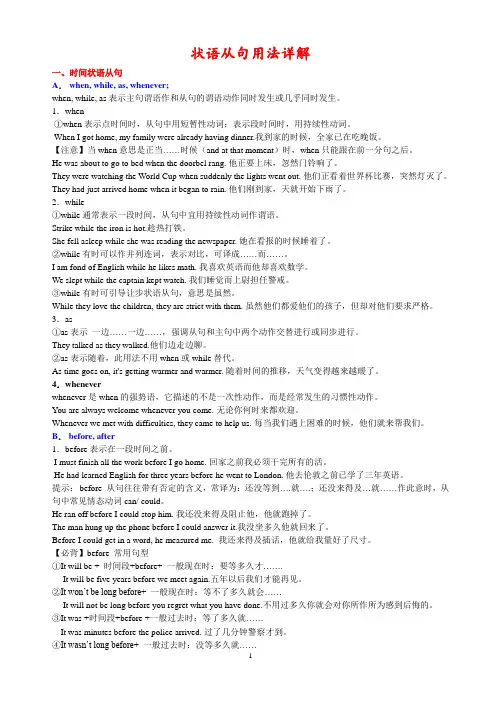
状语从句用法详解一、时间状语从句A. when, while, as, whenever;when, while, as表示主句谓语作和从句的谓语动作同时发生或几乎同时发生。
1.when①when表示点时间时,从句中用短暂性动词;表示段时间时,用持续性动词。
When I got home, my family were already having dinner.我到家的时候,全家已在吃晚饭。
【注意】当when意思是正当……时候(and at that moment)时,when只能跟在前一分句之后。
He was about to go to bed when the doorbel rang. 他正要上床,忽然门铃响了。
They were watching the World Cup when suddenly the lights went out. 他们正看着世界杯比赛,突然灯灭了。
They had just arrived home when it began to rain. 他们刚到家,天就开始下雨了。
2.while①while通常表示一段时间,从句中宜用持续性动词作谓语。
Strike while the iron is hot.趁热打铁。
She fell asleep while she was reading the newspaper. 她在看报的时候睡着了。
②while有时可以作并列连词,表示对比,可译成……而……。
I am fond of English while he likes math. 我喜欢英语而他却喜欢数学。
We slept while the captain kept watch. 我们睡觉而上尉担任警戒。
③while有时可引导让步状语从句,意思是虽然。
While they love the children, they are strict with them. 虽然他们都爱他们的孩子,但却对他们要求严格。
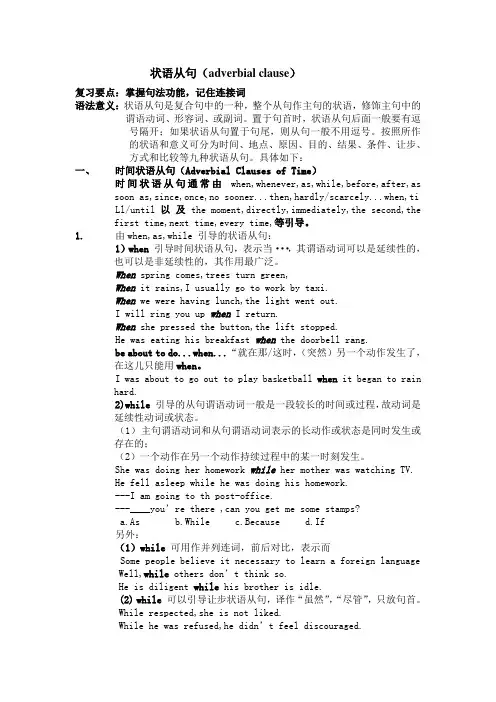
状语从句(adverbial clause)复习要点:掌握句法功能,记住连接词语法意义:状语从句是复合句中的一种,整个从句作主句的状语,修饰主句中的谓语动词、形容词、或副词。
置于句首时,状语从句后面一般要有逗号隔开;如果状语从句置于句尾,则从句一般不用逗号。
按照所作的状语和意义可分为时间、地点、原因、目的、结果、条件、让步、方式和比较等九种状语从句。
具体如下:一、时间状语从句(Adverbial Clauses of Time)时间状语从句通常由when,whenever,as,while,before,after,assoon as,since,once,no sooner...then,hardly/scarcely...when,tiLl/until 以及the moment,directly,immediately,the second,thefirst time,next time,every time,等引导。
1.由when,as,while 引导的状语从句:1)when 引导时间状语从句,表示当···,其谓语动词可以是延续性的,也可以是非延续性的,其作用最广泛。
When spring comes,trees turn green,When it rains,I usually go to work by taxi.When we were having lunch,the light went out.I will ring you up when I return.When she pressed the button,the lift stopped.He was eating his breakfast when the doorbell rang.be about to do...when...“就在那/这时,(突然)另一个动作发生了,在这儿只能用when。
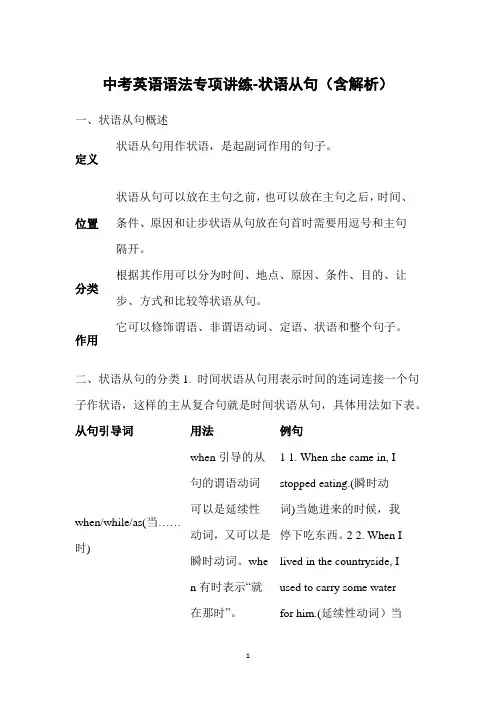
中考英语语法专项讲练-状语从句(含解析)一、状语从句概述定义状语从句用作状语,是起副词作用的句子。
位置状语从句可以放在主句之前,也可以放在主句之后,时间、条件、原因和让步状语从句放在句首时需要用逗号和主句隔开。
分类根据其作用可以分为时间、地点、原因、条件、目的、让步、方式和比较等状语从句。
作用它可以修饰谓语、非谓语动词、定语、状语和整个句子。
二、状语从句的分类1. 时间状语从句用表示时间的连词连接一个句子作状语,这样的主从复合句就是时间状语从句,具体用法如下表。
从句引导词用法例句when/while/as(当……时)when引导的从句的谓语动词可以是延续性动词,又可以是瞬时动词。
when有时表示“就在那时”。
1 1. When she came in, Istopped eating.(瞬时动词)当她进来的时候,我停下吃东西。
2 2. When Ilived in the countryside, Iused to carry some waterfor him.(延续性动词)当我住在乡下的时候,我经常带些水给他。
while引导的从句的谓语动作必须是延续性的,并强调主句和从句的动作同时发生(或者相对应)。
while 有时还可以表示对比。
1 1. While my wife was reading the newspaper, I was watching TV. (同时发生)当我妻子在读报纸的时候,我在看电视。
2 2. I like playing football while you like playing basketball.(对比)我喜欢踢足球,而你喜欢打篮球。
as表示“一边……一边”,as 引导的动作是延续性的动作,一般用于主句和从句动作同时发生;as也可以强调“一先一后”。
1. We always sing as we walk. (一边……一边)我们总是边唱边走。
2. As we were going out, it began to snow.(as强调句中两个动作紧接着先后发生)我们刚一出门就开始下雪了。
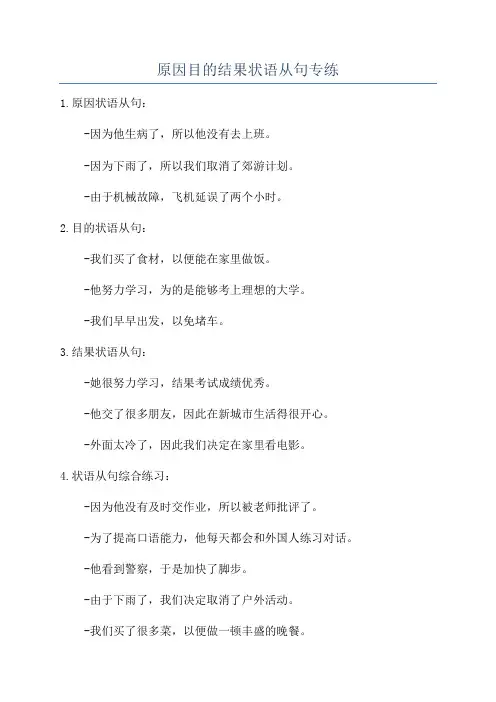
原因目的结果状语从句专练1.原因状语从句:
-因为他生病了,所以他没有去上班。
-因为下雨了,所以我们取消了郊游计划。
-由于机械故障,飞机延误了两个小时。
2.目的状语从句:
-我们买了食材,以便能在家里做饭。
-他努力学习,为的是能够考上理想的大学。
-我们早早出发,以免堵车。
3.结果状语从句:
-她很努力学习,结果考试成绩优秀。
-他交了很多朋友,因此在新城市生活得很开心。
-外面太冷了,因此我们决定在家里看电影。
4.状语从句综合练习:
-因为他没有及时交作业,所以被老师批评了。
-为了提高口语能力,他每天都会和外国人练习对话。
-他看到警察,于是加快了脚步。
-由于下雨了,我们决定取消了户外活动。
-我们买了很多菜,以便做一顿丰盛的晚餐。
-她学习很努力,结果考试得了满分。
-妈妈担心我走夜路不安全,所以每天都来接我放学。
-我们计划早早出发,以免迟到。
初中英语语法专练—原因、结果和目的状语从句-全考点详解一、状语从句状语从句是指在整句中作状语时,起副词作用的句子。
它可以修饰谓语、非谓语动词、定语、状语或整个句子。
根据其作用可分为时间、地点、原因、条件、目的、结果、让步、方式和比较等从句。
状语从句一般由连词(从属连词)引导,也可以由词组引起。
二、原因状语从句如果从句表示的是主句行为的原因,就构成原因状语从句。
原因状语从句由表示原因的连词引导,常用的有because,since,as等。
1.because引导的原因状语从句,表示的往往是读者不了解的、不明显的原因,是全句叙述的重点,语气最强。
because引导的原因状语从句既可以放在主句之前,用逗号隔开,也可以放在主句之后。
如:He failed the exam because he was too careless.2.since引导的原因状语从句,表示显然的或已为人知的理由,常译为"因为;既然"。
如:Since everyone is here,let's start our meeting.3.as引导的原因状语从句,意为"因为;由于",其语气不如because 强,通常为附加说明的理由,且是已知晓的原因,主句与从句没有逻辑上的因果关系。
如:As she wasn't well, I went there alone.三、结果状语从句如果从句表示的是主句行为的结果,就构成结果状语从句。
结果状语从句由表示结果的连词引导,常用的有so,so...that...,such...that...等。
1.so引导的结果状语从句,表示"由于某个行为而导致的结果",只能放在主句之后。
如:He worked too hard, so he fell ill again.注意:because和so不能同时用在一个句子里。
如:Because it rained heavily, we stayed at home./It rained heavily, so we stayed at home.2.so...that...引导的结果状语从句,意为"太......以致于......",so后面接形容词或副词(看so前面的词来决定用形容词还是副词,如果是系动词就用形容词;如果是行为动词,就用副词。
高中英语状语从句练习与讲解状语从句状语从句在句中相当于副词做状语,又叫副词性从句。
状语从句分为时间状语从句、条件状语从句、地点状语从句、原因状语从句、目的状语从句、让步状语从句、结果状语从句和比较状语从句。
掌握状语从句应当引导词入手,注意引导词的词义,引导状语从句的引导词都有词思,所以,了解引导词的意思尤为重要。
引导词按意义分为九类:1)时间when , as , while , till , until , before, after , since2)地点where3)原因because , as , since , now that4)条件if , unless , once .so (as)long as . in case5)让步though , whatever (--ever) as, even though, even if6)目的so that, in order that7)结果so ... that8)比较than, as .. as9)方式as , as if例如:1.I fell asleep when ( as , while ) he was doing his exercises .他正作练习时我睡着了。
(时间状语从句)2.When he arrived in Shanghai , his mother met him at the station .他到上海时,他妈妈到车站接他。
(时间状语从句)3.She always sings as she walks .她总是一边走一边唱。
(时间状语从句)4.I waited until he had finished his work .我等到他做完活。
(时间状语从句)5.It was not long before he told me about this affair .不久,他就告诉我这件事。
(时间状语从句)6.He has worked very hard since he entered the factory .自从他进厂,工作一直很努力。
状语从句〔一〕状语从句概述〔二〕状语从句详解1. 时间状语从句2.地点状语从句3.条件状语从句4.原因状语从句5.目的状语从句6.结果状语从句7.让步状语从句8. 比拟状语从句9.方式状语从句练习一一. 单项填空1. _______ he’s old, he can still carry this heavy bag.A. ThoughB. SinceC. ForD. So2. ---Do you know if he _______ to play basketball with us"---I think he will e if he ______ free tomorrow.A. es; isB. es; will beC. will e; isD. will e; will be3. In the zoo if a child _____ into the water and can’t swim, the dolphins may e up ______ him.A. will fall; to helpB. falls; to helpC. will fall; helpD. falls; helping4. I don’t remember ________ he worked in that city when he was young.A. whatB. whichC. whereD. who5. We will stay at home if my aunt ________ to visit us tomorrow.A. esB. eC. will eD. is ing6. The police asked the children _______ cross the street ________ the traffic lights turned green.A. not; beforeB. don’t; whenC. not to; untilD. not; after7. I was late for class yesterday _______ there was something wrong with my bike.A. whenB. thatC. untilD. because8. I’ll go swimming with you if I ________ free tomor row.A. will beB. shall beC. amD. was9. In the e*am, the ________ you are, ______ the _______ mistakes you will make.A. careful; littleB. more careful; fewestC. more careful; fewerD. more careful; less10. You should finish your lessons _______ you go out to play.A. beforeB. afterC. whenD. while11. I hurried _____ I wouldn’t be late for class.A. sinceB. so thatC. as ifD. unless12. When you read the book, you’d better make a mark _______ you have any questions.A. whichB. thatC. whereD. though13. The teacher raised his voice _______ all the students could hear him.A. forB. so thatC. becauseD. in order14. He took off his coat _______ he felt hot.A. becauseB. asC. ifD. since15. It is ______ that we’d like to go out for a walk.A. a lovely dayB. too lovely a dayC. so lovely a dayD. such lovely a day16. Mary had ______ much work to do that she stayed at her office all day.A. suchB. soC. tooD. very17. _______ I felt very tired, I tried to finish the work.A. AlthoughB. BecauseC. AsD. As if18. ______ the day went on, the weather got worse.A. WithB. SinceC. WhileD. As19. ______ well you can drive, you must drive carefully.A. So long asB. In order thatC. No matter howD. The moment20. Write to me as soon as you ________ to Beijing.A. will getB. getC. gettingD. got二. 根据中文意思完成以下英语句子1. 不管他跟我开什么玩笑,我都不生气。
►第10讲 状语从句 (讲义)目录一 复习目标 掌握目标及备考方向二 考情分析 2023年中考情态动词考情分析 三网络构建知识点头脑风暴四情态动词考向1. 状语从句的概念和分类2. 掌握时间、原因、条件、目的、结果、让步、比较等状语从句连接词的用法3.提升必考题型归纳五真题感悟 中考情态动词经典考题【复习目标】1.掌握状语从句的概念和分类2.掌握时间、原因、条件、目的、结果、让步、比较等状语从句连接词的用法【考情分析】状语从句做题方法: 1.翻译题干2.把题目中的逻辑关系理顺3.带入连接词一一对比,看谁最合适4.千万别忘了主将从现,主过从过等等时态规则5.多读状语从句培养语感,做题速度也会提升状语从句是历年各省市中考必考知识点。
从考查形式看,一般有单项选择、完形填空、词语运用等。
所占分值通常为2~4分。
另外注意状语从句和定语从句、名词性从句的区别;从命题意图看,侧重考查考生的具体语言环境中使用连词的能力。
【网络构建】一、状语从句概述考向二状语从句的连接词概念:在复合句中作状语的从句叫作状语从句。
状语从句一般修饰主句中的动词、形容词或副词等。
功能:九大状语从句分别表示(时间、条件、原因、地点、目的、结果、方式、让步、比较)等意义。
位置:位置灵活,可用于主句之前或之后。
1.when, while, as引导的时间状语从句2. 比较until和till此两个连词意义相同。
肯定形式表示的意思是"做某事直至某时",动词必须是延续性的。
否定形式表达的意思是"直至某时才做某事"。
动词为延续性或非延续性都可以。
正确使用这两个连词的关键之一就在于判断句中的动词该用肯定式还是否定式。
肯定句:I slept until midnight. 我一直睡到半夜时醒了。
Wait till I call you. 等着我叫你。
(在肯定句中可用before代替。
例如:Let’s get in the wheat before t he sun sets.)否定句:She didn’t arrive until 6 o’clock. 她直到6点才到。
原因、目的、结果状语从句讲练一、原因状语从句通常由because, since, as, for等词来引导。
连词because, as, since, for的用法区别:because表示原因时,用法最为广泛,语气也最强。
它所引导的从句可以放在主句之前或在主句之后。
例:1) -- Why are you always late for school? – Because my home is far from here.你为什么总是迟到?因为我家太远。
2) He can’t come to the party because he is busy.因为他忙,所以不能来参加这个聚会。
as在表示原因时,语气较强。
它所引导的从句常放在主句之前,意思是“由于”;把众人所知的事实当作理由。
例:1) As the bad weather, he was lost his way yesterday morning.由于恶劣的天气,他昨天早晨迷路了。
2) As Mr. Liu is the new comer, he doesn’t have too many friends here.刘先生由于初来乍到,因此在这儿没有太多的朋友。
since语气较弱。
它所引导的从句一般放在主句之前,意为“既然”;就对方陈述的事实作为理由。
例:1) Since Li Ming doesn’t know the answers to the problems, let’s ask Wang Lei to do it.既然李明不知道这道题的答案,那就让王磊来回答吧。
2) Since we are good friends, please call me if you need help.既然我们是好朋友,如需要帮助,请尽管打电话。
相比较而言,for的语气最弱。
其引导的从句放在主句之后,所表述的理由是对某一事实进行推断。
例:1) He thanked me for my help.他因为我帮助了他而感谢。
2)The woman didn’t buy that coat for it is too expensive.那位女士没有买那件上衣是因为它太贵了。
二、目的状语从句一般由in order that, so that来引导。
二者都表示“以便、为的是”之意。
此时,句中往往会用一些相关的情态动词来加以说明。
例:1) I’ll have to run fast so that I can catch up with them in a short time. (目的)我得快跑以便我能在短时间内赶上他们。
2) I opened the window so that fresh air could come in. (目的)我把窗户打开以便新鲜空气可以进来。
3) We will tell you everything about it soon in order that you can prepare for that.不久我们将会让你知道详情,以便你能够做准备。
(目的)三、结果状语从句通常由连词so…that, such…that引导。
二者都表示“如此…以至于”之意。
例:1) The teacher’s teaching was so interesting that all the students were very exc ited.老师讲课非常有趣,学生们都感到很兴奋。
2) Jack studies so hard that he always makes progress.杰克学习很是努力,结果他不断取得进步。
3) It’s such a nice day that all of us want to go camping.天气是如此的好,我们大家都想去野营。
● so …that … 与such … that…的用法区别:so + 形容词或副词+ that + 从句such + 形容词+a(an) + 单数可数名词+ that +从句。
但是这两种句型往往可以互换。
例:1) My grandfather is so kind that everyone likes talking with him.(= My grandfather is such a kind person that everyone likes talking with him)我爷爷心地善良,大家都喜欢和他聊天。
2) It is so cold that I have to wear warm clothes.(= It is such cold weather that I have to wear warm clothes.)天气如此的冷,以至于我不得不穿上暖和的衣服。
专项练习一、选择恰当答案。
1. Please speak loudly _____ all of us can hear you.A. so thatB. ifC. whenD. although2. He learned a little Japanese _____ he was at middle school.A. thoughB. althoughC. as ifD. when3. She was _____ tired _____ she could not walk any more.A. very, thatB. such, thatC. so, thatD. so, as4. I went to school in a hurry _____ I wouldn't be late for class.A. sinceB. so thatC. as ifD. unless5. The child was __ early in the morning.A. enough excited to get upB. too excited to get upC. so excited that he got upD. very excited, he got up6. Bring it nearer _____ I cannot see it clearly.A. althoughB. so thatC. becauseD. since7. It was ____ that she couldn’t finish it by herself.A. so difficult a workB. such a difficult workC. so difficult workD. such difficult work8. He can't buy the car ___ it was too expensive.A. forB. whenC. thatD. if9. I arrived there ___ late ___ I didn't meet him.A. too; toB. such; thatC. so; thatD. so; as10. It is ___ hot in the room ___ we have to use the fans.A. such; thatB. so; thatC. as; asD. such; as11. ___ you have no time, I have to ask someone else to play football.A. SoB. SuchC. So thatD. Since12. Lift it up___I may see it.A. thoughB. so thatC. asD. than13. I think we should go by plane ___ we can get there earlier.A. as soon asB. whereC. in order thatD. as14. Lily went to see the doctor yesterday ___ she was ill.A. becauseB. butC. untilD. if15. I'd like to go swimming now _____ it is very hot.A. forB. becauseC. ifD. whether二、将下列句子已成英文。
1、他太高兴了,以至于说不出话来。
____________________________________________________2、因为他就住在河边,因此很擅长游泳。
____________________________________________________3、刘翔刻苦训练跑步以便能在2008年的奥运会上取得好成绩。
____________________________________________________4、这个树太高,我爬不上去。
____________________________________________________参考答案:一、1-5 ADCBC6-10 CDA CB11-15DBCA B二、1. He was so excited that he could say nothing.2. Because he lives by the river, he is very good at swimming.3. Liu Xiang practices running hard so that he can get good achievements in the Olympic Games in 2008.4. The tree is so tall that I can’t climb it up.。